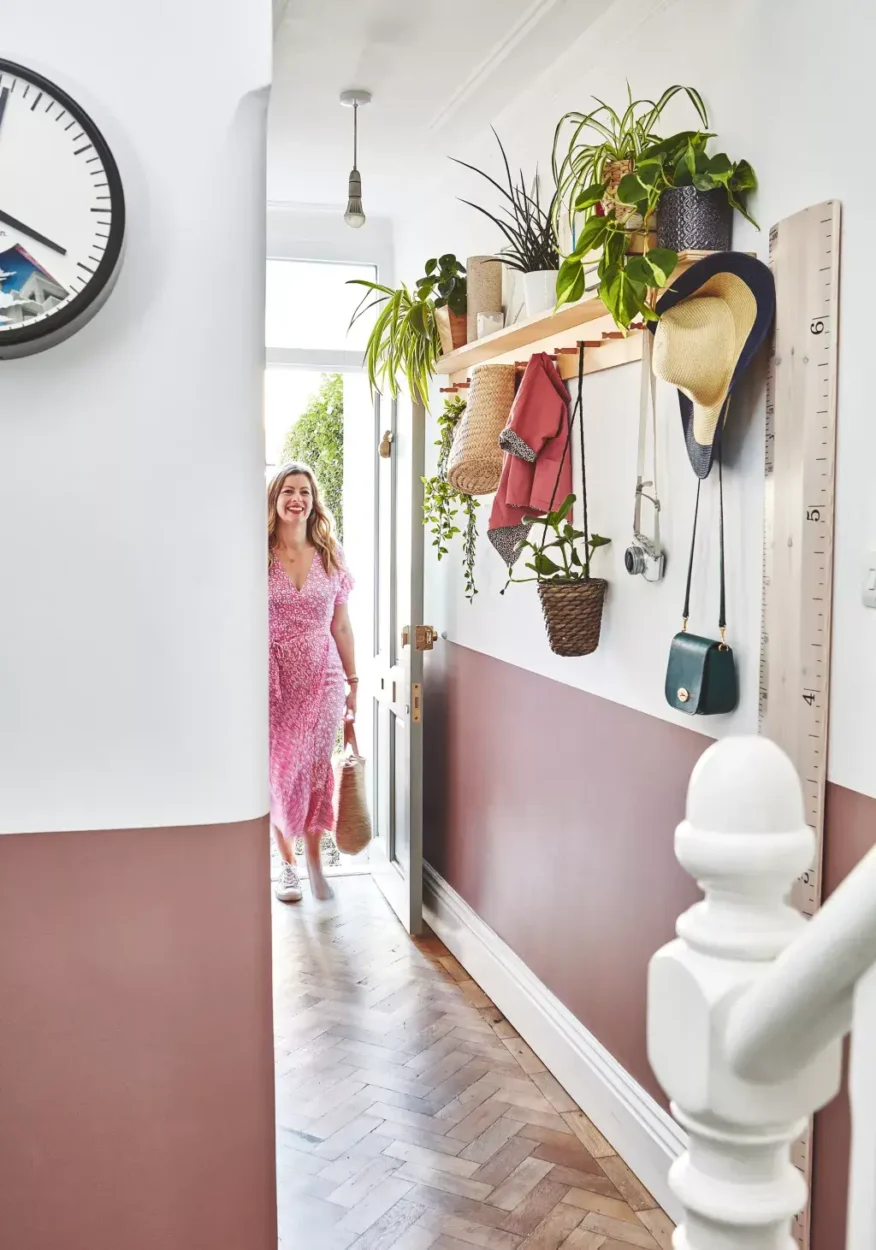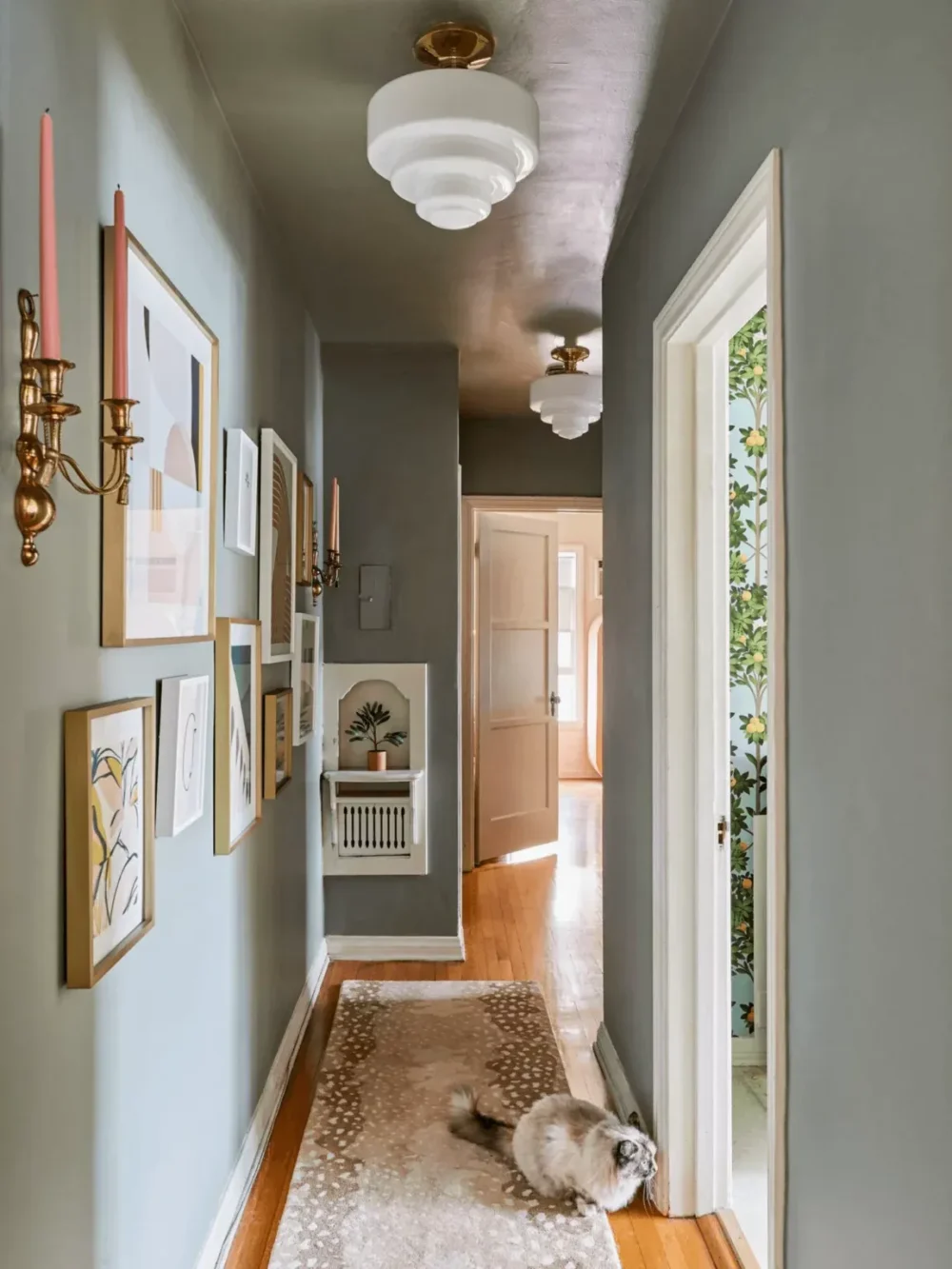In the realm of interior design, narrow hallways often pose a unique challenge, requiring creativity and strategic thinking to transform confined spaces into stylish focal points. The essence lies in navigating the constraints of tight dimensions while maximizing aesthetic appeal. This article delves into a comprehensive guide to offering innovative solutions for homeowners seeking to elevate their hallway decor.
From optimizing vertical space to playing with colors and patterns, each suggestion is tailored to visually expand the area and infuse it with personality. Join us on a journey of discovery as we explore practical tips, expert insights, and real-life case studies, empowering you to turn your narrow hallway into a chic and inviting passageway.
Maximizing Vertical Space: Narrow Hallway
- Tall Shelves and Cabinets: In cramped hallways, the key is to go vertical. Tall shelves and cabinets draw the eye upward, creating an illusion of height and space.
- Vertical Artwork and Mirrors: Strategically placed vertical artwork and mirrors add aesthetic appeal and contribute to the perception of a more expansive area.
- Strategic Lighting Solutions: Clever lighting can make a hallway feel brighter and more open. Consider wall sconces or pendant lights to illuminate the space without taking up valuable floor space.
Optimal Furniture Choices For Narrow Hallway
- Slim and Multipurpose Furniture: Choosing slim and multipurpose furniture is essential for narrow hallways. Opt for pieces that serve a dual purpose, such as a bench with built-in storage.
- Floating Furniture for an Airy Feel: Floating furniture, like wall-mounted shelves and consoles, creates an airy ambiance and gives the illusion of a larger hallway.
Clever Storage Solutions
- Utilizing Nooks and Crannies: Nooks and crannies are often underutilized in hallways. Incorporate shelves or small cabinets into these spaces for additional storage without sacrificing style.
- Hidden Storage Options: Investing in furniture with hidden storage compartments lets you declutter the hallway while maintaining a stylish appearance.
Playing with Colors and Patterns For Narrow Hallway
- Light Color Palette for an Open Look: Light colors reflect more light, making a narrow hallway feel brighter and more open. Choose a light color palette for walls, furniture, and decor.
- Strategic Use of Mirrors and Patterns: Mirrors create depth, making hallways appear more spacious. Integrate mirrors and subtle patterns into the decor for an added sense of dimension.
Creating Illusions of Space
- Mirrored Surfaces: Mirrored surfaces, whether in furniture or decor, visually expand the hallway by reflecting light and surroundings.
- Striped Patterns to Lengthen the Hallway: Vertical stripes create the illusion of length, making a narrow hallway feel more extended than it is.
Personal Touches and Decor
- Artwork and Photo Galleries: Infuse your personality into the hallway with artwork and photo galleries. Gallery walls can be a striking focal point in a confined space.
- Indoor Plants for Freshness: Introducing indoor plants not only adds a touch of nature but also brings freshness to the hallway, making it more inviting.
Flooring Choices
- Light-colored Flooring for Brightness: Choosing light-colored flooring further enhances the brightness of the hallway, contributing to an overall open and airy feel.
- Longitudinal Flooring for an Extended Look: Opt for flooring with longitudinal patterns to create the illusion of an elongated space.
Balancing Functionality and Aesthetics
- Practical Storage with Style: Finding the right balance between functionality and aesthetics is crucial. Opt for storage solutions that serve a purpose while enhancing the hallway’s visual appeal.
- Choosing Furniture that Fits the Space: Select furniture proportionate to the hallway’s dimensions to avoid overcrowding and maintain a harmonious look.
Tips for Maintenance
- Keeping Clutter at Bay: Regularly decluttering the hallway is essential. Keep only the items that serve a purpose or add to the decor to avoid a cramped appearance.
- Regular Cleaning and Organization: Maintain a clean and organized hallway to ensure that the space feels welcoming and well-maintained.
Real Life Case Studies

Explore real-life examples of well-styled narrow hallway ideas, gaining inspiration from successful design solutions implemented by homeowners and interior designers.
Expert Insights
Learn from the experts as interior designers share their tips for maximizing style in the tight narrow hallway ideas. Discover common mistakes to avoid and key considerations for effective hallway design.
Budget-Friendly
Embark on affordable DIY projects to enhance your hallway’s style without breaking the bank. Discover cost-effective decor options that make a big impact.
Future Trends in Hallway Styling
Get a glimpse into emerging designs and innovations in hallway styling. Explore sustainable options that align with the growing trend of eco-friendly home decor.
People Also Ask
Can I use dark colors in a narrow hallway?
While light colors are recommended for brightness, strategic use of dark colors can create a cozy and intimate atmosphere. Consider a balance that suits your preferences.
Are vertical stripes the only pattern that works in narrow hallway?
Vertical stripes are effective, but other patterns like chevrons or herringbone can also elongate the space. Experiment with different patterns to find what suits your style.
What is the ideal lighting for a narrow hallway?
Wall sconces and pendant lights are great choices for narrow hallways. Ensure the lighting fixtures complement the overall style and provide adequate illumination.
How often should I declutter my hallway?
Regular decluttering is recommended to maintain a tidy and spacious feel. Aim for a quick decluttering session every few weeks to keep the hallway organized.
Can indoor plants be used in a narrow hallway?
Yes, indoor plants can add freshness and a touch of nature to a narrow hallway. Choose low-maintenance plants and position them strategically to enhance the decor without obstructing the walkway.
Conclusion
As we conclude this journey, remember that narrow hallway ideas need not be a design impediment but a canvas waiting for your unique touch. By implementing the strategies discussed, you can turn your hallway into a testament to ingenuity, showcasing that style knows no boundaries. Embrace the challenge, infuse your personality, and witness as your once-overlooked passageway evolves into a captivating feature of your home. With these insights, embark on your design journey, transforming tight spaces into corridors of aesthetic delight. Your hallway awaits its stylish metamorphosis.


